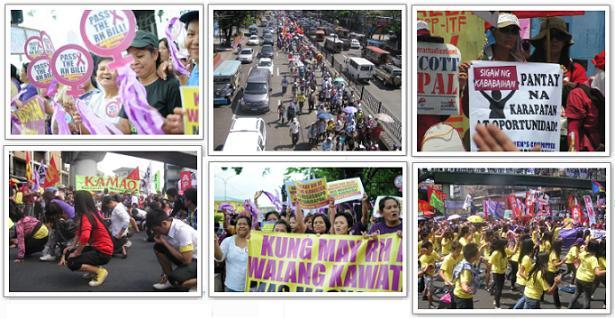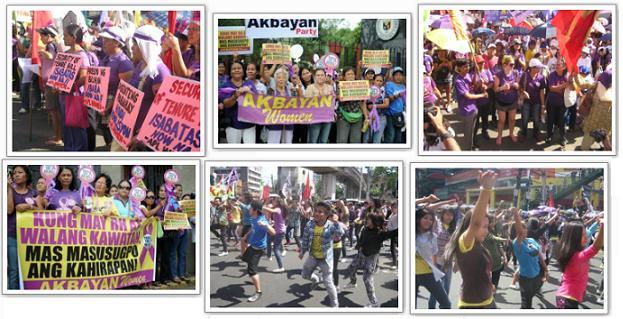

Plaats een aanvulling
Filipino Women March against US Military Expansion in the Philippines and the Pacific
Wanneer: 10/03/2012 - 13:34
On the occasion of the International Women’s Day 2012, we, Filipino women declare in strongest terms possible, our opposition not only to increased presence but to U.S. military presence per se on Philippine soil.


The United States is increasing its military presence in Asia-Pacific, in particular in the Philippines, and the Philippine government is showing no qualms in allowing this to happen.
A news account recently reported of the United States’ plan to increase its military aid to “boost” Philippine defense; the promised aid will amount to US$144 million, reflecting an increase of more than US$20 million on the previous amount. In another earlier news article, U.S. Ambassador to the Philippines Harry Thomas was quoted as saying his government had spent US$50 million for the upgrading of Philippine military facilities.
The Washington Post in January 2012 also reported that Philippine officials were in the United States to conduct initial talks with representatives of the Obama government “about expanding the American military presence in the island nation…” More high-level and intense discussions will take place this March.
The same Washington Post piece quoted a senior Philippine official as saying “We can point to other countries: Australia, Japan and Singapore. We’re not the only one doing this, and for good reason. We all want to see a peaceful and stable region. Nobody wants to have to face China or confront China.” The US has “about 600 Special Operations troops in the Philippines, where they advise local forces in their fight with rebels sympathetic to al-Qaeda,” the report also confirmed.
But really disturbing news was on the use of U.S. drone in the January bombing in Parang, Jolo, which came out in Hong Kong-based Asia Times Online. “A United States-supported airstrike that destroyed with causalities an Abu Sayyaf hideout on the remote island of Jolo in the southern Philippines represented the first known use of the unmanned aerial assault craft in the Armed Forces of the Philippines (AFP) counter-insurgency operations against terrorism-linked rebel groups,” said the article.
We recognize the continuing insecurity in the Asia-Pacific due to the contending claims of Southeast Asian countries, including the Philippines and China over the Spratly Islands. But time and again it has been the call of people’s movements and civil society groups throughout the region that this territorial conflict must be resolved by multilateral dialogue among the countries involved and not with the intervention or through the posturing of a military power like the US.
We don’t deny the reality of terrorism that continues to unfold in many parts of the world, even as many of these have been a result of and have been further intensified precisely by U.S. policies, but the Philippines should not be drawn into this US-led war on terror. The Philippine government should instead stand side-by-side with other nations and peoples who call for multi-polar ways of looking at and resolving these conflicts. Without being isolationist and immune to geopolitical realities, the Philippine government must not at all costs surrender our sovereignty.
Why a stand against militarization? Militarization is not only about the presence of warm uniformed bodies, as it spills over other aspects of women’s lives. It exists and persists because of force that turns into violence—which is not anymore just about fighting the enemies using destructive weapons, but about militarization itself as a weapon that creates and supports a culture of violence; the same force underpinning rape, assault on women’s bodies and minds, trafficking and prostitution, domestic abuse, discrimination against those with differing gender orientation.
This is not at all different from another form of violence that also oppresses and ravages Filipino women—economic marginalization resulting from the neo-liberal policy orientation of government.
Neo-liberalization has meant for Filipino women labor contractualization or flexibilization, which hasn’t only further decreased employment opportunities, but has also caused many women to labor in oppressive situations, mainly characterized by depressed wages and insecure working conditions.
Privatization and deregulation, even of basic services and resources considered national patrimony, are also cornerstones of a neo-liberal economy. And it’s not only women in the labor sector and urban areas who are continuously assaulted by these economic policies, which have also opened the agriculture sector to big business, private investments, easing out small and medium-scale landholders and producers. Until now, women in the agriculture sector have remained invisible and their contributions un-quantified in official statistics; yet the more privatization occurs, the more they lose whatever access to lands and land resources they have been able to fight for inch by inch. With privatization and foreign investments becoming the order of the day, the completion of the land and distribution aspect of the agrarian reform program is becoming more and more a distant reality, even as it has been made clear that the current government is no longer prioritizing agrarian reform.
On another level, the persistent intervention of religious fundamentalism in the realm of public policy-making results in depriving women of vital health services, which could cause them their life.
The P-Noy government cannot claim to be on the “straight path” as long as it continues to ignore the economic, social and sexual violence committed against women, while it upholds the primacy of neo-liberalization and militarism. The alignment of the P-Noy regime with the US, as shown by its support for increasing US troop presence in the Philippines, is of deep concern to us and we will continue to struggle against it.
To the powers that be, we say NO to U.S. military expansion in the Philippines and Asia-Pacific! NO to the Philippine government’s support for this expansionism! On March 8, 2012, and beyond, listen to the sounds of our feet marching, to our voices singing protest, to our poetry, stories, testimonies and speeches shouting out our opposition, and watch us transform this opposition into more actions of resistance!
Signatories:
Akbayan–Youth • Amnesty International • Alliance of Progressive Labor • Asian Circle 1325 • Bagong Kamalayan • BATIS • Batis-AWARE • Buklod • Bukluran ng Manggagawang Pilipino – Kababaihan • CATW-AP • Center for Migrants’ Advocacy • Center for Overseas Workers • Development Action for Women Network • Focus on the Global South • Free Burma Coalition • Freedom from Debt Coalition • Initiatives for International Dialogue • Kababaihan-Pilipinas • KAISA-KA • KAMP • LRC-KSK/FOE-Phils. • MATINIK • Medical Action Group • Partido Lakas ng Masa • Partido ng Manggagawa • PAHRA • PEACE • PKKK • Piglas Kababaihan • PREDA • SARILAYA • Transform Asia • WEDPRO • WomanHealth Phils. • Women’s Legal and Human Rights Bureau • Welga ng Kababaihan • Women’s Crisis Center • YSAGE • World March of Women – Pilipinas
http://www.facebook.com/pages/Alliance-of-Progressive-Labor-APL/31551937...
http://www.facebook.com/pages/AKBAYAN-PARTYLIST/61953501555
http://www.youtube.com/watch?v=vwH0nWf98cE&feature=youtu.be
Tags: imperialism Philippines US